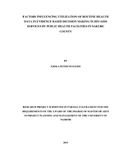| dc.description.abstract | Most Ministries of Health across Africa invest substantial resources in some form of health
management information system (HMIS) to coordinate the routine acquisition and
compilation of monthly treatment and attendance records from health facilities nationwide.
The relationship of improved information, demand for data, and continued data use creates
a cycle that leads to improved health programs and policies. However, despite the expense
of the HMIS, poor data coverage means they are rarely, if ever, used to generate reliable
evidence for decision makers. The purpose of this study was to examine the factors
influencing the utilization of routine health data in evidence based decision making by
public health facilities offering HIV treatment services in Nakuru County. According to
the Kenya HIV Estimates Technical Report of 2013, Nakuru County is one of the 10
counties with the highest number of people (61,598) living with HIV/AIDs in the county
and therefore chosen as a study point. The study adopted a descriptive survey research
design. The study was guided by the following objectives; to assess the influence of data
quality on evidence based decision making; to establish the influence of data availability
on evidence based decision making; to examine the influence of capacity on data use
competencies in evidence based decision making and to investigate the influence of
institutional support in evidence based decision making by public health facilities in
Nakuru county. A structured questionnaire was used to collect data from 58 respondents
from 33 health facilities providing HIV/AIDs treatment services. A stratified random
sampling technique was used to achieve the desired representation of the various subgroups
within the population and simple random sampling was applied to identify
respondents from the facilities. Data was analyzed using frequencies, percentages, mean,
standard deviation, coefficient of variation and correlation coefficient with the aid of
Statistical Packages for Social Sciences (SPSS) computer software version 20.0. The
results were presented in tables. From the coefficient correlation analysis, only data quality
and capacity on data use had significant positive relationship on evidence based decision
making. I.e. data quality at r =.368** with p =.004 (<0.05) and capacity on data use
competencies r =.323* with p =.013 (<0.05). There was no significant relationship between
data availability r =.059 with p = 662 (>0.05) and institutional support r =.087and p = .514
(>0.05) with evidence based decision making. The study therefore recommends that there
is need to develop and implement data quality protocols at the health facilities, train health
care providers on synthesis and communication of routine health data using appropriate
channels, need for training in leadership and advocacy skills for health managers to
leverage on funding and sustaining data use and demand interventions and lastly, need to
develop standard operating procedures that clearly state the role and value of data in
organizational functioning. There is need for further research on the cost and effectiveness
of using routine health data in planning and management. | en_US |

